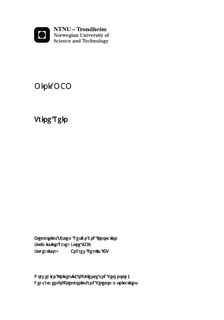Mini-MAM
Master thesis
Permanent lenke
http://hdl.handle.net/11250/2371014Utgivelsesdato
2014Metadata
Vis full innførselSamlinger
Sammendrag
As the amount of digital content outside the broadcasting industry increase, the need for Media Asset Management systems among this new wave of content owners has increased. An efficient, user friendly and cheap MAM system is required to satisfy their demands, a system we will denote as "Mini-MAM". A MAM system is the core component for a content owner in organizing their content and associated metadata. Traditionally, MAM systems are complex and expensive systems, where most features are unnecessary for the intended users of a Mini-MAM. The goal of this thesis, is to design, implement, and test a proposed Mini-MAM system, that fits the demands of these new content owners.The thesis will explain the basics of a MAM system, and explore the importance of metadata in terms of content management. The thesis will also indentify the primary requirements of the Mini-MAM system in order to meet the demands of small and non traditional content owners. This thesis highlights the important decisions made during the development of the system, as well as the obstacles that had to be overcome. The Mini-MAM is written using Python, relying primarily on the Tkinter library to create the interface. The Mini-MAM also relies on the SQLite database management system to store persistent data, and the ffmpeg media framework for transcoding.\\The system has also been compared to a commercial exhibition management system in subjective assessment of the two systems. The other system to be assessed was the Expoloy XMS system, designed to manage the content of exhibition centres and museums. The assessment had 14 subjects perform basic tasks on the two systems, before answering a questionnaire where the subjects rate the user friendliness and usability of each system. The results from the subjective assessment showed that the Mini-MAM was the more user friendly system.The participants rated the systems on a scale from 1-5, where 1 is bad, and 5 is excellent. The participants rated their general impression of the Mini-MAM's user friendliness a score within the 95\% confidence interval of 3.60-4.25. In comparison, the participans rating of the XMS System that fell inside the 95\% confidence interval of 1.64-2.51. 100\% of the users also reported that, as non-experts, they preferred the Mini-MAM system.From the results of the subjective assessment, is clear that the Mini-MAM fulfils its role as a user friendly and intuitive system. Despite the XMS system being a far more extensive and powerful system, the complexity of the system confused the untrained participants. The Mini-MAM fulfils the basic requirements outlined in the thesis, and is easy to for new users. Despite being a prototype, the Mini-MAM shows promise, and can with further development, become a commercially viable system.
